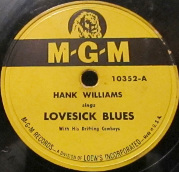
A honky-tonk is both a bar that provides country music for the entertainment of its patrons and the style of music played in such establishments. It can also refer to the type of piano used to play such music. Bars of this kind are common in the South and Southwest United States. Many eminent country music artists, such as Jimmie Rodgers, Loretta Lynn, Patsy Cline, Ernest Tubb, Johnny Horton, and Merle Haggard, began their careers as amateur musicians in honky-tonks.

The Drifting Cowboys were the backing group for American country legend and singer-songwriter Hank Williams. The band went through several lineups during Williams' career. The original lineup was formed in 1937, changing musicians from show to show until Williams signed with Sterling Records.
Donald "Don" Hugh Helms was a steel guitarist best known as the steel guitar player of Hank Williams's Drifting Cowboys group. He was a member of the Steel Guitar Hall of Fame (1984).

"Lovesick Blues" is a Tin Pan Alley song, composed by Cliff Friend, with lyrics by Irving Mills. It first appeared in the 1922 musical "Oh, Ernest", and was recorded that year by Elsie Clark and Jack Shea. Emmett Miller recorded it in 1925 and 1928, followed by country music singer Rex Griffin in 1939. The recordings by Griffin and Miller inspired Hank Williams to perform the song during his first appearances on the Louisiana Hayride radio show in 1948. Receiving an enthusiastic reception from the audience, Williams decided to record his own version despite initial push back from his producer Fred Rose and his band.

Dreaming My Dreams is the twenty-second studio album by American country music artist Waylon Jennings. The album was co-produced with Jack Clement and recorded at Glaser Sound Studio in Nashville, Tennessee, between February and July 1974.
"Ramblin' Man" is a song written in 1951 by Hank Williams. It was released as the B-side to the 1953 number one hit "Take These Chains from My Heart", as well as to the 1976 re-release of "Why Don't You Love Me". It is also included on the 40 Greatest Hits, a staple of his CD re-released material.
"Honky Tonk Blues" was a hit country and western song written and performed by Hank Williams. The original 1952 recording was a major hit, and it later became a hit for later-day superstar Charley Pride.

The Smithsonian Collection of Classic Country Music was a multi-volume set of recordings released by the Smithsonian Institution. Released in 1981, the collection contains 143 tracks deemed to be significantly important to the history of country music.

Ace in the Hole Band is the backup band for American country music performer George Strait, who was the band's lead singer before beginning his solo career in the early 1980s. The band formed at San Marcos, Texas in the 1970s, and recorded several singles for "D Records" including the Strait-penned "I Just Can't Go On Dying Like This" and "I Don't Want To Talk It Over Anymore". After Strait attained status as the "King of Country", the group released an album of its own in 1995 featuring vocals from Darrell McCall and Mel Tillis.

Out of Hand is a 1975 honky tonk album by country music singer Gary Stewart. The singer's second album, his debut for RCA Records, reached #6 on Billboard's Country Albums chart, launching three charting singles, "Drinkin' Thing" (#10), "Out of Hand" (#4), and "She's Actin' Single " (#1). The album, a departure from prevalent country styles at the time of its release, was a critical as well as a commercial success and has come to be regarded as a classic in the honky tonk genre.
"Big Bill" Lister was an American honky tonk country music singer. Born Weldon E. Lister, he was nicknamed "Radio's Tallest Singing Cowboy," standing over 6-foot-7 without his cowboy boots and hat.
"Honky Tonkin'" is a 1947 country music song, written and recorded by Hank Williams. His song went to #14 on the Billboard country music chart in 1948. In 1982, it became the sixth chart topping single for Williams' son, Hank Williams Jr.
"Mind Your Own Business" is a 1949 song written and originally performed by Hank Williams.
"I'm a Long Gone Daddy" is a country song written and recorded by Hank Williams. It was released in 1948 on MGM Records and became his second top ten hit.
"Let's Turn Back the Years" is a song written and originally recorded by Hank Williams for MGM Records.
"I'm Sorry for You, My Friend" is a song written and recorded by Hank Williams. It was released as the flipside to his single "Honky Tonk Blues" in 1952 on MGM Records.
Moanin' the Blues is Hank Williams' second album released on MGM Records released in 1952.
Pictures from Life's Other Side" is a traditional song popularized by Hank Williams under the pseudonym "Luke the Drifter." It was released on MGM Records in 1951.






